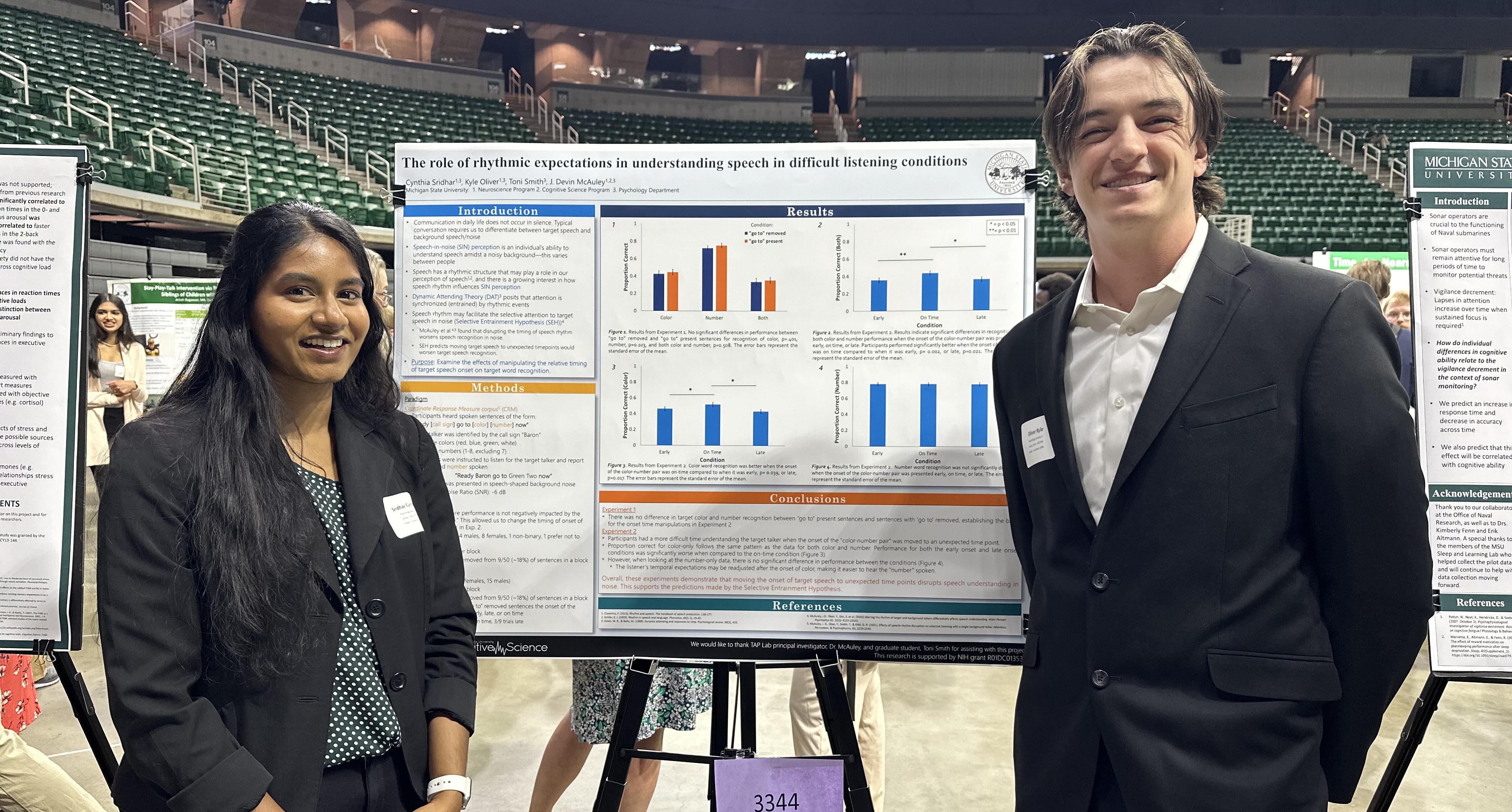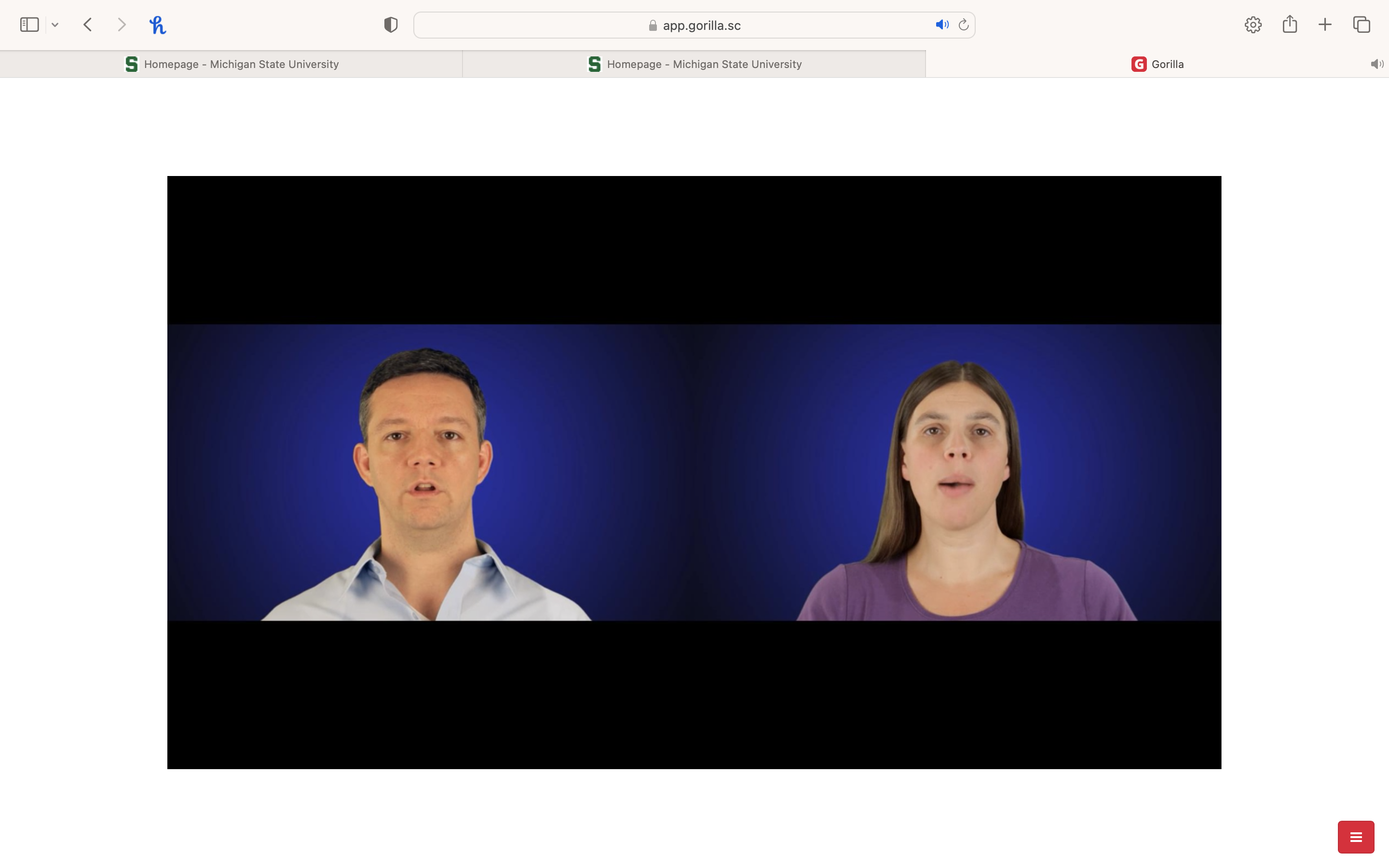PSY Student Research Spotlight: Kyle Oliver
December 11, 2023 - Shelly DeJong

Kyle Oliver, a senior psychology and neuroscience double major, has been working in the Timing, Attention, and Perception Lab since his first year at MSU. This year, he received a Dean’s Assistantship Award from the College of Social Science to help fund his own research experiment with his mentor Dr. Devin McAuley. We met with Kyle recently to talk about research experience and how its helping to shape his future.
How did you get involved with the TAP Lab?
Coming in my first year, I had a research scholarship through the Honors College. They sent me a questionnaire about potential research interests and ultimately paired me up with Dr. Devin McAuley. I didn't even know there was research on this type of stuff coming into college and I was fortunate enough to get paired with Devin. I have nothing but great things to say about him. He's really good at getting students involved in the lab. Every member of the lab is working on a project, and we meet with him weekly. I’ve learned a ton since I’ve been here. And I would have never been able to get this Dean's Assistantship or the PURI Award last year without a great amount of help from him and other lab members as well.
Can you tell me about the research you’re doing because of receiving the Dean's Assistantship Award?
The main project I've been working on in the TAP Lab focuses on how we process speech in noisy environments. Dr. McCauley suggested we come up with an experiment together to see if I could get a Dean’s Assistantship Award, which is a great source of funding. After brainstorming ideas, we landed on an audio-visual project to see how visuals impact the way in which we interpret people's speech. The main focus of the experiment that we're running for the Dean's Assistantship is looking at how speech rhythm manipulations impact our ability to understand speech and noise and seeing if there is an additive effect between audio rhythm manipulations and visual rhythm manipulations. Like, if you manipulate the audio and the visual at the same time, how does that impact participants’ ability to understand speech and noise versus if you're just manipulating the video rhythm or if you're just manipulating the audio rhythm.
 We’ve been doing piloting in the lab, but recently we ran our first official participant. In the experiment, participants are presented with pre-recorded audio and visuals of two talkers on the screen. The talkers each say a five-word sentence. The participant's goal is to identify the words the specified target talker is saying and ignore the other talker we call the background talker. This is also presented amongst background noise to simulate a noisy environment, and the goal is to pick out exactly what the targeted talker is saying. The different audio and visual manipulation conditions are cycled through randomly. We also have one other manipulation refer to it as onset asynchrony where we mismatch the audio to the video to see how that impacts people's ability to understand what the target talker is saying.
We’ve been doing piloting in the lab, but recently we ran our first official participant. In the experiment, participants are presented with pre-recorded audio and visuals of two talkers on the screen. The talkers each say a five-word sentence. The participant's goal is to identify the words the specified target talker is saying and ignore the other talker we call the background talker. This is also presented amongst background noise to simulate a noisy environment, and the goal is to pick out exactly what the targeted talker is saying. The different audio and visual manipulation conditions are cycled through randomly. We also have one other manipulation refer to it as onset asynchrony where we mismatch the audio to the video to see how that impacts people's ability to understand what the target talker is saying.
What do you mean by rhythm manipulations?
What we’re technically doing is compressing and stretching out what's called the speech envelope. What you'll hear is the speeding up and slowing down of the speech rhythm throughout the sentence that the target talker says. When you listen to it presented with no background noise, you can clearly tell that is not how a typical person talks in cadence and rhythm. With a noisy background, it can be a lot trickier to tell. Our hypothesis is that when you alter the rhythm of the person you're trying to listen to, your ability to understand will worsen. The idea is that the normal predictable speech rhythms help our brains predict when words are going to be said next so we can specifically listen at those specified time points. Altering that rhythm will mismatch the alignment of when you're expecting people to say something, which will make it harder to understand exactly what the target talker is saying.
What's next for you?
We’ll be running this experiment this semester and the beginning of next semester. We're hoping to take what we find and present it at UURAF. We're looking to apply to some other conferences, too. And then going forward, I hope to pursue a degree in clinical psychology. I'm hoping this can be a good stepping stone into the world of academia by giving me experience in how academic research works.
What originally drew you to psychology?
I got very interested in the brain and neuroscience when I was 12 or 13 years old. and stuff like that. I always thought I wanted to go into neurology and go to med school. But late in high school, I took AP Psychology and absolutely loved that class. Once I got to State, I decided to major in both neuroscience and psychology because they pair really well. Throughout college, I've realized I enjoy the psychology side more. I realized that I really like the people aspect of psychology and interacting on a broader scale rather than getting bogged down in biology and chemistry. I still love the neuroscience stuff, but I find myself much more engaged in learning about psychology. I like how the fields are becoming more and more intertwined, though, which I think will be beneficial in the future.
Has anyone else helped you along the way?
I’d love to give a shoutout to Toni Smith, a grad student in the TAP Lab. She has helped me a ton in the TAP Lab including contributing and helping me with my design experiment. Carrie Kroger graduated last year but she was also a great mentor in the lab.
Do you have any advice for students who are maybe thinking about research or are curious about it?
Don't be intimidated by the world of research. Don't be hesitant because you think you're not smart enough or have the capabilities to do academic research. From my experience, the faculty want you to succeed and want you to reach your goals.
Be willing to not be the smartest person in the room and not always expecting to know everything. It's a process! I remember just starting out and it seemed like they were using words that didn't even make sense like acronyms and fancy jargon. It took a few years to fully orient myself and to fully understand what was going on.
Everyone I've encountered has been super helpful and I’ve appreciated how collaborative the community is. I feel like everyone is working together to progress our scientific understanding.

